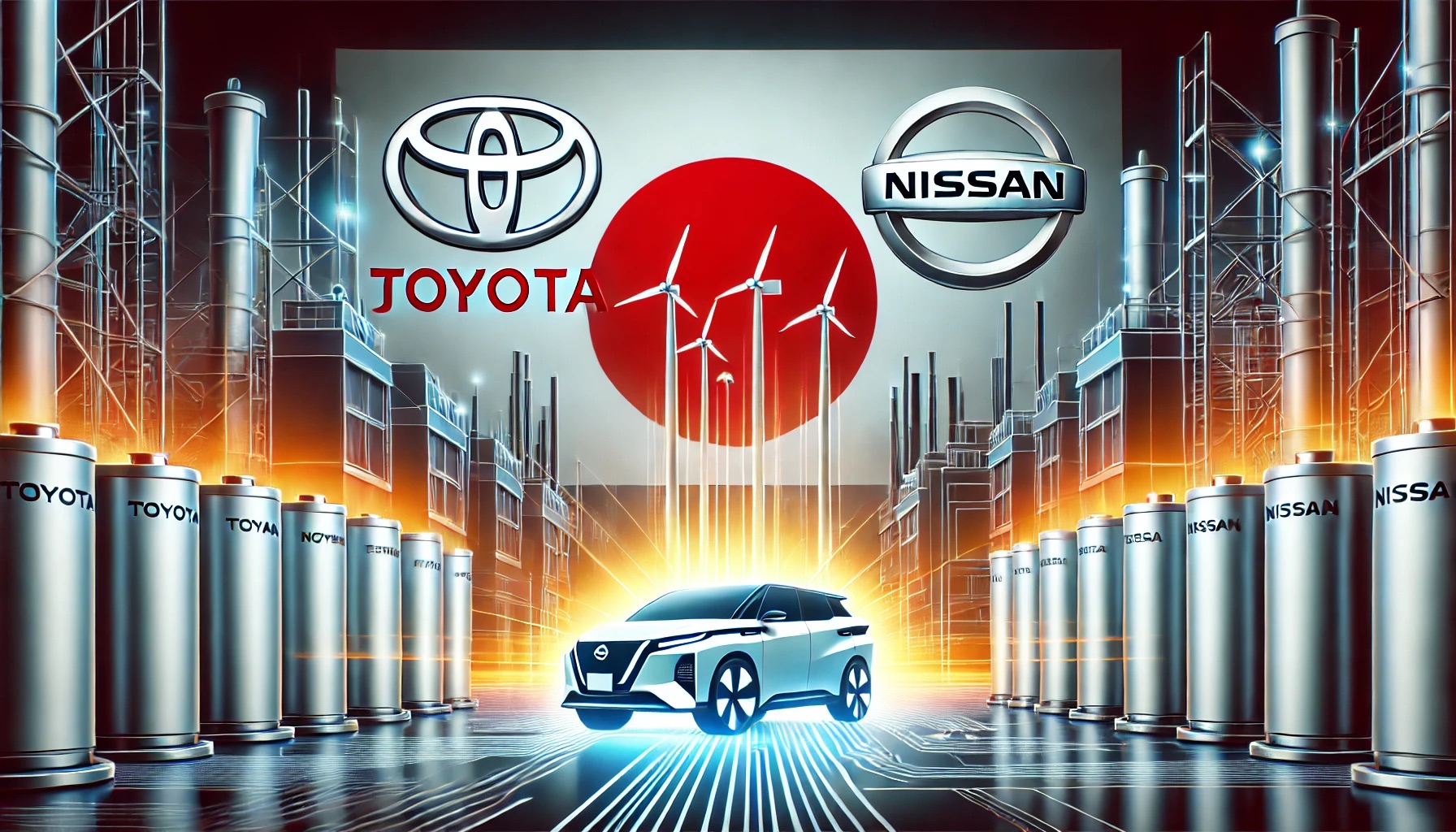Toyota and Nissan will spend $7 billion to raise Japan’s EV battery production by 50%, seeking to reduce reliance on China and South Korea as global leaders in the electric vehicle battery market.
Toyota, Nissan to Invest $7 Billion in EV Batteries
Japanese corporations will spend $7 billion (1 trillion yen) to increase the country's production of electric vehicle batteries, with Toyota and Nissan among them.
In an effort to diversify its supply chain away from the present market dominance by South Korea and China, the Japanese government will lend a hand.
Japan Falling Behind in Electric Vehicle Adoption
When it comes to the transition to electric vehicles, Electrek claims that Japan is one of the countries that has lagged behind. Early this year, sales of electric vehicles in the United States dropped by 39%.
The Japan Light Motor Vehicle and Motorcycle Association reports that domestic passenger EV sales were 29,282 units in June 2024, representing a 39% decrease compared to the previous year. From the first half of 2023 to the second, the percentage of passenger car sales that were electric vehicles fell from 0.7% to 1.6%.
Foreign Competition Harming Japan's EV Industry
The absence of alternatives is a major factor. A representative from the Japan Automobile Importers Association (JAIA) told Argus that foreign names are destroying the Japanese electric vehicle (EV) market.
Japanese corporations, such as Toyota and Nissan, are pouring resources into establishing a reliable supply chain for electric vehicle batteries.
Nikkei reports that a number of Japanese corporations, including Toyota and Nissan, will spend a combined $7 billion (1 trillion yen) to increase output of storage batteries by almost 50%.
Japan Targets 150 GWh EV Battery Output by 2030
Production would increase from 80 GWh to 120 GWh with the help of the funds. The target is to achieve 150 GWh by the year 2030. The Japanese government is planning to announce soon that it will be allocating up to $2.44 billion, or 350 billion yen, to the cause.
The research states that Japan is trying to ensure a steady supply of EV batteries since China and South Korea are the market leaders.
With intentions to increase battery production at two subsidiaries, Toyota is anticipated to spend approximately $1.7 billion, or 250 billion yen. Also, by 2029, Toyota plans to have a brand new electric vehicle battery plant up and running, which will supply the next Lexus EVs.
Nissan intends to start producing LFP batteries in 2028 after investing approximately $1 billion (150 billion yen).
In an effort to increase domestic production, Subaru and Mazda have partnered with Panasonic, a Japanese company, to manufacture electric vehicle battery components. Around $3.8 billion, or 550 billion yen, is what it is anticipated to put in.
China's EV Batteries Lead the Global Market
Updated statistics from SNE Research show that Chinese EV batteries continue to dominate the international market. As of July 2024, CATL held a dominant 37.6% share of the market, with BYD in second place with 16.1%.
Third and fourth, respectively, with 12.4% and 4.7% of the market, were South Korean companies LG Energy Solution and SK On.



 Trump Orders Federal Agencies to Halt Use of Anthropic AI Technology
Trump Orders Federal Agencies to Halt Use of Anthropic AI Technology  FCC Approves Charter Communications’ $34.5 Billion Acquisition of Cox Communications
FCC Approves Charter Communications’ $34.5 Billion Acquisition of Cox Communications  Snowflake Forecasts Strong Fiscal 2027 Revenue Growth as Enterprise AI Demand Surges
Snowflake Forecasts Strong Fiscal 2027 Revenue Growth as Enterprise AI Demand Surges  Nvidia Earnings Preview: AI Growth Outlook Remains Strong Beyond 2026
Nvidia Earnings Preview: AI Growth Outlook Remains Strong Beyond 2026  Nvidia Earnings Preview: AI Chip Demand, Data Center Growth and Blackwell Shipments in Focus
Nvidia Earnings Preview: AI Chip Demand, Data Center Growth and Blackwell Shipments in Focus  Anthropic Resists Pentagon Pressure Over Military AI Restrictions
Anthropic Resists Pentagon Pressure Over Military AI Restrictions  Trump Pushes Tech Giants to Build Power Plants to Offset AI Data Center Energy Costs
Trump Pushes Tech Giants to Build Power Plants to Offset AI Data Center Energy Costs  Lynas Rare Earths Shares Surge on Strong Half-Year Earnings and Rising Global Demand
Lynas Rare Earths Shares Surge on Strong Half-Year Earnings and Rising Global Demand  Trump Media Weighs Truth Social Spin-Off Amid $6B Fusion Energy Pivot
Trump Media Weighs Truth Social Spin-Off Amid $6B Fusion Energy Pivot  OpenAI Hires Former Meta and Apple AI Leader Ruomin Pang Amid Intensifying AI Talent War
OpenAI Hires Former Meta and Apple AI Leader Ruomin Pang Amid Intensifying AI Talent War  BlueScope Steel Shares Drop After Rejecting Revised A$15 Billion Takeover Bid
BlueScope Steel Shares Drop After Rejecting Revised A$15 Billion Takeover Bid  Amazon’s $50B OpenAI Investment Tied to AGI Milestone and IPO Plans
Amazon’s $50B OpenAI Investment Tied to AGI Milestone and IPO Plans  Coupang Reports Q4 Loss After Data Breach, Revenue Misses Estimates
Coupang Reports Q4 Loss After Data Breach, Revenue Misses Estimates  FAA Plans Flight Reductions at Chicago O’Hare as Airlines Ramp Up Summer Schedules
FAA Plans Flight Reductions at Chicago O’Hare as Airlines Ramp Up Summer Schedules  Samsung Electronics Stock Poised for $1 Trillion Valuation Amid AI and Memory Boom
Samsung Electronics Stock Poised for $1 Trillion Valuation Amid AI and Memory Boom  Toyota Plans $19 Billion Share Sale in Major Corporate Governance Reform Move
Toyota Plans $19 Billion Share Sale in Major Corporate Governance Reform Move  Samsung and SK Hynix Shares Hit Record Highs as Nvidia Earnings Boost AI Chip Demand
Samsung and SK Hynix Shares Hit Record Highs as Nvidia Earnings Boost AI Chip Demand 































